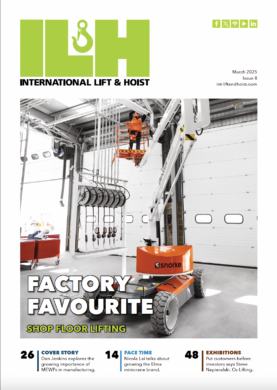)
The value of apprenticeships
Ross Moloney, CEO of the Lifting Equipment Engineers Association (LEEA), looks at the ways apprenticeships offer value to the Lifting industry and to the apprentices themselves.
Supply chains emerging from the constraints of the pandemic and its lockdowns are struggling to meet rapid escalations in demand, particularly in terms of having sufficient labour. While the immediate headline-hitting labour shortage effects may dissipate, many sectors will continue to grapple with longer-term labour issues. The lifting industry is, as we know, one of these.
According to the recent CBI and Pertemps Network annual survey, around three quarters (76%) of businesses are reporting access to labour as a threat to the UK’s labour market competitiveness. Asked for their top factors vital to labour market competitiveness, 89% said finding enough people with the right skills.
Ageing working populations and, for the UK, the removal of a simple stop gap of EU workers, raises the importance of training because, unlike other social and political factors, it is something that lies within the control of sectors themselves. Making better use or people within a business becomes even more important where there are labour shortages, and for some this means overcoming a reluctance to train. Young people are being urged to consider apprenticeships as many industries suffer the biggest labour shortage in decades. Many feel an apprenticeship can be looked upon as a salary with training.
Fortunately, the lifting sector is keen to get going on apprenticeships and the Lifting Equipment Technician apprenticeship work in England, driven by LEEA, is now awaiting ministerial sign off. The hope is that what is being done in England will be echoed across the globe. The newly formed Regional Council in Australia and New Zealand has made bringing to life a similar solution for their market place its number one priority.
Promoting the lifting sector as a career option for young people is a key goal for LEEA. By creating apprenticeships in close partnership with employers in the Lifting Industry we can ensure that that they are built around the high demand for the right kind of skills in the sector.
The post pandemic environment will be a key time to be making an apprenticeship offer. Interestingly, recent UCAS research, revealed that more than three quarters (78%) of students who received their A-level results in August, but do not plan to immediately start a three-year full-time undergraduate degree, are interested in starting an apprenticeship to develop new skills while earning.
The report, called: ‘Where next? Who doesn’t plan to start a full-time undergraduate degree in autumn?’, sheds new light on the thoughts and plans of remainder of young people choosing to take a different route. The main features that make apprenticeships attractive to young people include choosing options that “earn money” (50%), to continue learning but in “a different way” (43%), and to do something “new and different” (42%).
The Think Lifting programme, established by LEEA together with LHI, has been aimed at making Lifting appeal to school age children, now it seems even more important if the programme captures the interest of these students.
As mentioned, the lifting sector is fortunate to have strong enthusiasm for apprenticeships. It will be further encouraged by the findings of another report published in September by the St Martin’s Group, an organisation created to support the UK economy by fostering a sustainable, quality-focused and employer-led apprenticeship and skills system. ‘The Real Costs and Benefits of Apprenticeships’ uncovered that apprentices’ output surpasses their associated costs, delivering a net benefit to employers during their training for those beginning their qualification in 2020/2021. This is likely to increase further upon completion of training and remaining with an employer as apprentice costs and expenses are removed, and productivity increases.
The survey conducted by YouGov provided further insight into the benefits experienced by employers of apprentices. It found that 98% of employers that currently employ apprentices experienced additional benefits to their business. Among the most cited were ‘addressing skills shortages’ and ‘providing value for money’.
Any sector must ensure a supply of skills to feed continual growth. Working together setting its own skills agenda means it can develop training and apprenticeships based on its needs. This is what the Lifting Equipment Technician apprenticeship in England promises, and it will be a reality very soon.











